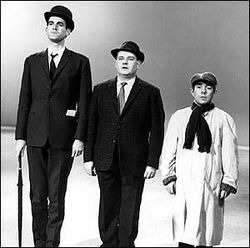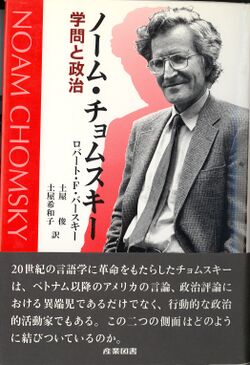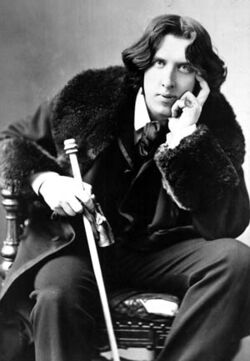Social commentary
“Some people are on the pitch! They think it's all over... it is now!”
A Social commentary is the spoken word, or voice-over, recorded for use within a documentary film (although in recent years it has been expanded to the written word within national broadsheets, and other publications).
Traditionally presented in gravelly, hushed tones, this style remains the most popular form, whether the voice-over is performed by the clipped English accent of Richard Briers, the rich, warm resonance of Leslie Nielsen, or the rolling sonorous vocalisation and open familiarity of Clive James.
| “ | And we're here in the heartland of the nation, in the ancestral home of the middle classes, where we are able to witness a feral pack of accountants taking down a traffic warden. The alpha male, whom we have named "Julian"... | ” |
An Overview
Social Commentary has many applications within modern media. Television news is often presented as a series of video clips of newsworthy events, with a running social commentary by the reporters describing the significance of the scenes being presented.
In the cases where the nature of the subject matter is of a negative value, the voice over becomes part of the sub-genre of Anti-Social Commentary. This technique is utilised frequently amongst young amateurish reporters and bitter, twisted individuals such as Michael Moore, usually in reporting about the disaffected youths of our inner cities, or complaining about some governmental conspiracy or other.
| “ | The group, urging each other into acts of bravado, begin to circle the injured traffic warden, who, whilst winged, remains a threat in individual combat... | ” |
Social Commentary in Popular Culture
Politics
Governments have long realised that the political will of the nation is often restricted by the voting patterns of you, the voting public. Many political figures were of the opinion that people, blinded by vague ideals and blue-sky thinking such as aspiration, freedom and hope, had lost their understanding of their true position within society.
In order to educate the masses many governments rely on the use of Social Commentary within the broader field of Public Relations. Public Relations is a management function which tabulates public attitudes, defining policies, procedures and the interests of an organization (in this case the ruling elite), followed by the execution a program of action to earn public understanding and acceptance, also called brainwashing. In recent years this process has proved to be most successful.
| “ | The traffic warden, gourged on doughnuts, makes one more effort to escape, leaping majestically over a parked Volvo, until one of the junior accountants, who we have called Butch, rushes in for the kill. The final blow is fatal, and the pack close in to feast, augmented by a nice Chardonnay, and a side salad with fresh herbs... | ” |
Films, Radio and Television
As already discussed, a number of political figures demonstrate a clear understanding of social commentary in the delivery of their speeches, as well as within interviews. A number of film makers have been known to utilise the technique, including notables such as Leni Riefenstahl and Stanley Kubrick.
Others such as Don LaFontaine have pushed the opinion that "in a world gone mad....the voice of one man, CAN make the difference." In what many consider a shameless piece of self-publication, Don has also stated on numerous occasions that "if you should listen to only one Movie Trailer Announcer Guy this summer, make it this one."
A number of US comedy shows such as The O'Reilly Factor and The Colbert Report rely heavily on Social Commentary in order to make a series of obvious and simplistic links to factors within modern society.
Music
The musical world has long held a tradition of utilising the methodology of Social Commentary. Past masters of the art include Woody Guthrie, Shabtai Zisel ben Avraham and Charles Manson and in more recent years artists such as Rob and Fab of Milli Vanilli have made it a cornerstone of their act.
In 2004, The Cheeky Girls' European hit The Cheeky Song (Touch my Bum), itself based on Aristophanes' Lysistrata, demonstrated that Social Commentary within music could still prove to be a most powerful technique.
| “ | And so...as the sun sets on the great plains of Middlesex, and the day draws to its close, our pack returns to their lair, sated and content. Tomorrow, will be a whole new day... | ” |
See Also
| Featured version: 6 September 2007 | |
| This article has been featured on the main page. — You can vote for or nominate your favourite articles at Uncyclopedia:VFH. | |




